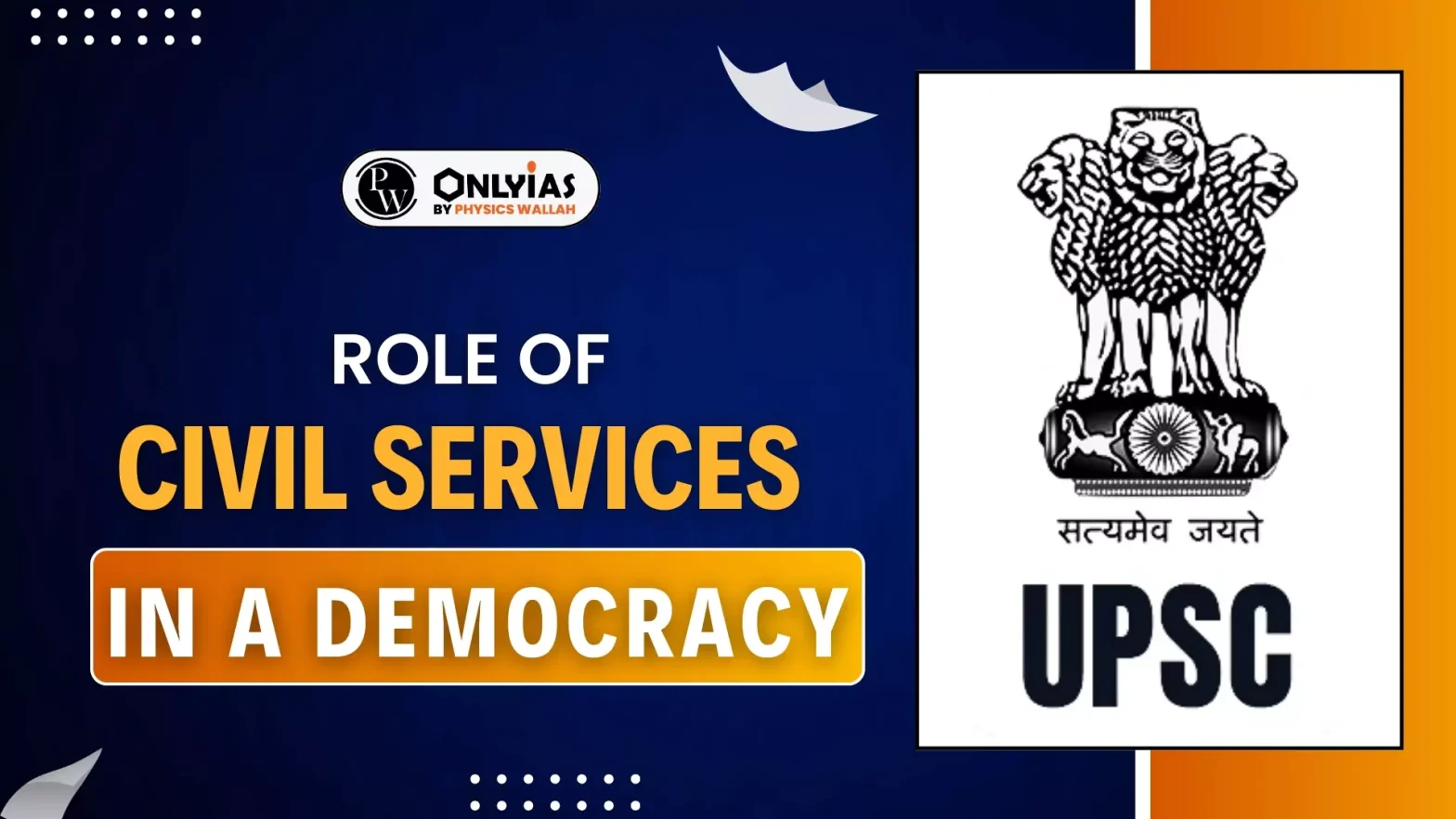The role of Civil Services in a Democracy is an essential topic for UPSC aspirants. Read more about the role of Civil Services in a Democracy and their powers and functions.

Role of Civil Services in a Democracy: Civil services form the backbone of a democratic government, ensuring stability, continuity, and efficient functioning of public administration. Civil servants play a crucial role in policy implementation, welfare programs, and governance, bridging the gap between government and citizens. This article will explore the fundamental role of civil services in democracy, particularly in India, their relationship with democratic principles, and their powers and functions.
In a democracy, civil services operate as impartial and dedicated entities tasked with implementing government policies and serving the people. Civil servants are guided by transparency, accountability, and fairness, ensuring that governance remains efficient and responsive to citizens’ needs.
Key Functions in a Democratic Setup:
By fulfilling these responsibilities, civil services help realize democratic ideals, including equality, justice, and participation, ensuring citizens have access to basic rights and opportunities.
Civil services uphold democratic principles by being impartial, transparent, and accountable. In democratic governance, the people exercise power through elected representatives. However, a well-organized and neutral bureaucracy is essential for effective administration, ensuring that policies benefit the public equitably.
Core Aspects of the Relationship:
Civil services bridge the state and society, facilitating trust and cooperation. This relationship forms the bedrock of good governance, ensuring the public interest is always at the forefront.
Civil services have significant powers and responsibilities in India. They are instrumental in executing laws, managing resources, and running various government programs. These powers and functions are well-defined, allowing civil servants to uphold the Constitution and work in the public’s best interest.
Primary Functions:
Through these functions, Indian civil services uphold democratic governance, strengthening the state’s effectiveness and reliability in citizens’ daily lives.
The constitutional structure that governs the recruitment, service conditions, protection, and oversight of civil services in India, reinforcing their role as impartial and accountable administrators within the democratic system. Constitutional Provisions Related to the Indian Civil Service to further clarify the framework and authority provided to civil services in India:
| Article | Provision | Description |
| Article 308 | Definition of Civil Services | Defines the scope and meaning of civil services in India, covering both Central and State civil services. |
| Article 309 | Recruitment and Conditions of Service of Persons Serving the Union or a State | Empowers Parliament and State Legislatures to create laws regulating recruitment and service conditions for civil servants. |
| Article 310 | Doctrine of Pleasure | Provides that civil servants hold office at the pleasure of the President (Central) or the Governor (State), indicating that civil servants do not have absolute job security. |
| Article 311 | Dismissal, Removal, or Reduction in Rank of Persons Employed in Civil Capacities Under the Union or a State | Protects civil servants from arbitrary dismissal or reduction in rank, providing due process through inquiry before such actions can be taken. |
| Article 312 | All-India Services | Allows Parliament to create All-India Services (e.g., IAS, IPS) if deemed necessary in the national interest, thus establishing services that serve both the Centre and States. |
| Article 315 | Public Service Commissions (PSC) | Establishes the Union Public Service Commission (UPSC) for the Union and Public Service Commissions for each state, to conduct recruitment exams and advise on service matters. |
| Article 316-319 | Appointment and Conditions of Service for Members of Public Service Commissions | Defines the eligibility, tenure, and conditions of service for members of UPSC and State PSCs, ensuring impartiality and fair recruitment practices. |
| Article 320 | Functions of Public Service Commissions | Enumerates the functions of UPSC and State PSCs, including recruitment, promotions, transfers, disciplinary matters, and any other matters referred to them by the President or Governor. |
| Article 323 | Administrative Tribunals | Empowers Parliament to establish Administrative Tribunals for resolving disputes and complaints related to recruitment and service conditions of persons appointed to public services. |
Bureaucracy plays an integral part in supporting civil services, as it provides the organized framework within which these services function. While “bureaucracy” is often associated with red tape, it is essential for structured administration and orderly implementation of policies.
Civil Services’ Role within Bureaucracy:
In essence, bureaucracy provides a stable environment for civil services, enabling a non-political, rule-based system that upholds fairness and impartiality.
Civil services have evolved with democratic needs, adapting to address the modern challenges of governance, resource management, and public expectations. They serve as pillars of good governance, ensuring the seamless execution of welfare programs, public order, and essential services.
Why Civil Services are Essential:
Civil services are essential in modern democracies because they form the backbone of administration, ensuring that governance remains fair, efficient, and people-centered.
Sign up for the PWOnlyIAS Online Course by Physics Wallah and start your journey to IAS success today!
UPSC Exam 2025 Related Articles
UPSC Prelims 2025 Exam
UPSC Notification 2025
UPSC Preparation 2025
UPSC Eligibility 2025
UPSC Exam Pattern
UPSC Syllabus
Civil services implement policies, maintain law and order, deliver public services, and ensure stable, effective governance in the public interest.
A civil servant in a democracy implements government policies, ensures public service delivery, and maintains stability and accountability in governance.
Civil services enhance transparency, accountability, and impartiality, managing resources efficiently and bridging the gap between government and citizens.
Civil servants are appointed based on merit and implement policies independently, while politicians are elected to make policy decisions and oversee governance.
Civil servants can enforce laws, manage resources, ensure public safety, implement policies, and may hold quasi-judicial powers for administrative decisions.
<div class="new-fform">
</div>